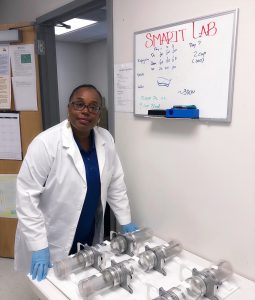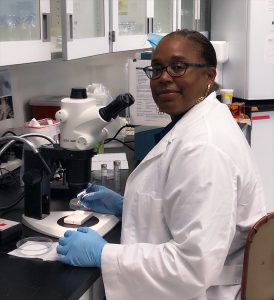VERO BEACH, Fla. – For decades, females have been at the forefront of careers in science, technology and mathematics (STEM). They generate scientific breakthroughs and inspire innovation in a variety of careers across the globe.
For UF/IFAS, Chelsea Smartt is a scientist and associate professor at the Florida Medical Entomology Laboratory. In research, Smartt tackles mosquito-borne illnesses in one of the life sciences.
As Women’s History Month wraps up on this last week of March and April embraces the Military Child, Smartt shares how a passion for molecular biology drives her research and dedication for engaging youth in STEM.
 Q: Tell us about your life before UF/IFAS?
Q: Tell us about your life before UF/IFAS?
A: I was born in Kentucky, but I grew up in a several places because my dad was in the United States Air Force.
My dad was stationed in a few states and countries. For example, I lived in Germany and Spain as a baby and toddler.
From the age of seven to 11, I lived in Africa on a technical campus. My father taught machinists and boxing. My siblings and I learned Swahili to attend school because it wasn’t an English-speaking institution. We adapted quickly. We wouldn’t have been able to succeed in school otherwise. We did what other kids were doing. It was almost seamless. That is when I became most interested in science. My first memory in Africa was seeing all the butterflies. Encountering the variety of animals and wildlife is how I developed a love for science. The school we attended was far away, and there was no transportation, so we walked for long distances and long periods of time. We made many friends. It’s interesting how quickly one can adapt.
I spent the longest time in Tennessee as a child when I was older.
Q: Did you always want to become a scientist?
A: I was always interested in science because I was fascinated by nature. In high school, I decided being a scientist was for me. During undergrad, I decided I would be a molecular biologist. Being a scientist allows me to work on biological problems whose solutions might shed light on a mystery.
Q: Where and what did you pursue as undergraduate and graduate degrees?
A: I earned my bachelor’s degree in biology from Tennessee State University. I obtained my Ph.D. from the University of California, Irvine, in molecular biology and biochemistry.
 Q: Why molecular biology?
Q: Why molecular biology?
A: Molecular biology drives the body. It’s the life force of every organism. It is what makes us up, and it is fascinating. Molecular biology is like a puzzle and a mystery all in one.
For my bachelor’s degree, I attended an HBCU (Historically Black College or University). It catered to African Americans. It did not have many resources, but there was a National Institute of Health- funded program that provided for research experience at our home institution during the fall and at other universities during the summer. The program strived to provide us with the opportunities to conduct research in a laboratory. I had a professor for a botany class who taught genetics. That is when I became interested in molecular biology. I joined the research program. During the summers, we were able to go to another university to conduct laboratory research.
Even with the school’s limited resources, it was a valuable experience for me that laid the foundation for my research today.
Q: Tell us about your life at UF/IFAS?
A: I applied to UF to work specifically at the Florida Medical Entomology Laboratory. This facility had the most faculty working on mosquitoes of any place at the time that I was researching.
The focus of my research currently is to interfere with the ability of mosquitoes to transmit viruses to humans. My research has identified several gene products whose disruption and silencing impacted the ability of a mosquito to become infected with West Nile virus (WNV), as well as affect the number of eggs that females could produce. These findings would reduce the spread of WNV and impact the number of mosquito populations produced.
One of our most promising genes disrupted egg development. If we impact the egg production process, this ultimately could reduce the mosquito population.
Q: What is your most memorable achievement?
A: In my professional life, it’s being awarded a National Institute of Health Southeast Regional Centers for Excellence for Biodefense and Emerging Infections grant in 2013. With this grant, I was able to gain great insight into different attributes of mosquito populations. We had two mosquito populations that had the ability to disseminate WNV. One population was from Vero Beach and the other was from Gainesville. I proposed that there were gene expression differences driving how the virus transmitted more successfully in one population over the other. It was the Gainesville population. Learning the differences provided great insight.
Q: What do you consider to be your most prized discovery?
A: My most prized work was discovering that Aedes albopictus eggs collected in Brazil were infected with the Zika virus. We proved that there was vertical transmission of Zika in these mosquitoes, which led to many laboratory studies confirming. This was a critical finding in the science.
Q: You have dedicated a considerable amount of time to exposing disadvantaged youth to STEM. Tell us about it.
A: My journey in this rewarding opportunity started when I came across the Gifford Youth Achievement Center.
It started after I arrived to UF/IFAS and came across their after-school program. I would introduce the kids to science by showing them the fundamentals. It became a way for me to give back and expose the life sciences to youth who might not otherwise have that opportunity.
I get my lab involved when I can. For the past few years, I have been pursuing funding to develop more projects. My goal is to get the youth to think of STEM as viable careers before they become undergraduates. Eventually, I would like to enhance the center’s science curriculum.
Q: What words of inspiration would you give to females across the world?
A: I would say to pursue any career that interests you. When you find what you are passionate about, work hard to make it a reality. Be your own advocate and champion. You cannot be hesitant to speak up for yourself as no one else will. There will be obstacles and hard times but working smart and being tenacious will enable you to overcome many of the setbacks.
-30-
By Lourdes Mederos, rodriguezl@ufl.edu
The mission of the University of Florida Institute of Food and Agricultural Sciences (UF/IFAS) is to develop knowledge relevant to agricultural, human and natural resources and to make that knowledge available to sustain and enhance the quality of human life. With more than a dozen research facilities, 67 county Extension offices, and award-winning students and faculty in the UF College of Agricultural and Life Sciences, UF/IFAS brings science-based solutions to the state’s agricultural and natural resources industries, and all Florida residents.
ifas.ufl.edu | @UF_IFAS
 4
4
